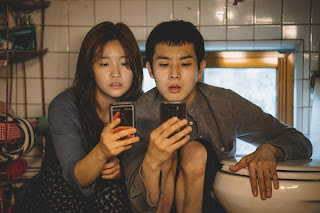Friday, 7 February 2020
Movie Review: Parasite (2019)
A social drama with biting humour and canny twists, Parasite provides piercing commentary on internecine class warfare disguised as upward mobility.
In Seoul, the poor Kim family lives in a cramped semi-basement. Father Ki-taek (Song Kang-ho) is good natured but has stopped looking for work. His enterprising low-key son Ki-woo (Choi Woo-shik) finds employment as an English tutor for Da-hye (Jeong Ji-so), the daughter of wealthy tech tycoon Park Dong-ik (Lee Sun-kyun). The Parks live in an impressive modern house designed by a renowned architect. Ki-woo quickly realizes he can take advantage of Da-hye's naive but well meaning mother Yeon-gyo (Cho Yeo-jeong).
He contrives an opportunity for his feisty sister Ki-jeong (Park So-dam) to tutor Da-hye's younger brother Da-song, and soon Ki-taek and his wife Chung-sook (Chang Hyae-jin) are also employed by the Parks after the Kims plot the ouster of the chauffeur and housekeeper. Just when the fortunes of the Kim family are looking up, the dismissed housekeeper Moon-gwang (Lee Jung-eun) reappears and reveals a shocking secret. The Kims are suddenly confronted by the prospect of losing everything they worked for.
The intrinsic, almost irresistible drive to move up in the world and the price to be paid in exchange for elevated social status receive a grilling in Parasite. Director and co-writer Bong Joon-ho composes a narrative of two families living in the same city but on different planets, rubbing against each other with superficial delicacy hiding incalculable estrangement. The outcome is an enthralling stress test with escalating degrees of discomfort.
Parasite is as much about two families as it is about two places. The Kims' household is partially subterranean and kept economically afloat by leeching WiFi from neighbours and opening the windows to allow street fumigation to dispose of the resident cockroaches. The local drunk urinates in front of their window, and sewer water flooding the streets flows into the apartment, leaving the top of the toilet seat as the final place of refuge.
In contrast the Parks live in a spacious architectural jewel of concrete, steel, open space, contemporary furniture and wondrous landscaping. At the first opportunity the Kim family take over the living room and transform it into a trashy dump of crumbs and wrappers, a celebration that turns into a ceremonial beginning of the end. The Kims are destined to meet a most unexpected guest, leading to a disruption of another domestic arrangement, this one brimming with potential for danger.
The story's construction requires some logic leaps, as the ingenuity demonstrated by the Kims to infiltrate the Park household is inconsistent with their initial economic stature. But otherwise Bong assembles an intricate and fleet-footed train wreck featuring a cunning plan running afoul of its own victims and laced with wicked humour.
A majestic music score nurtures running themes about the dangers of crossing lines and the inescapable stench attached to the lower classes as Bong builds to a jarring, almost Tarantinoesque climax. The rush to success leaves a trail of unsuspecting casualties, and karma can be particularly jagged in luxurious surroundings filled with sharp edges.
With one monster unleashed and social barriers penetrated on multiple fronts, all expectations of decorum are comprehensively violated.
All Ace Black Blog Movie Reviews are here.
Subscribe to:
Post Comments (Atom)





No comments:
Post a Comment
We welcome reader comments about this post.